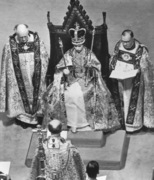 On the Moral Maze they were discussing the place of religion in society again. What struck me was that none of the Christian participants was willing to defend the establishment of the Church of England. The Catholic commentator Clifford Longley was for disestablishment, and Rev George Pitcher of the Telegraph supposed that he was too. The Evangelical vicar Steve Chalke didn’t quite face the issue, but kept insisting that the churches must reject any form of privilege in order to serve society. It was left to Melanie Phillips and Michael Portillo to suggest that the established church might be a good thing.
On the Moral Maze they were discussing the place of religion in society again. What struck me was that none of the Christian participants was willing to defend the establishment of the Church of England. The Catholic commentator Clifford Longley was for disestablishment, and Rev George Pitcher of the Telegraph supposed that he was too. The Evangelical vicar Steve Chalke didn’t quite face the issue, but kept insisting that the churches must reject any form of privilege in order to serve society. It was left to Melanie Phillips and Michael Portillo to suggest that the established church might be a good thing.
The establishment of the C of E is still just about defensible in secular conservative terms: it’s a force for stability, a source of national identity, a brake on religious extremism, et cetera. But people who care about the public image of Christianity are warier. They sense that the aura of privilege makes a Christian perspective less credible. Why should one denomination of one faith be allowed a degree of power, or at least prestige, that its popularity on the ground does not merit?
The next day the Guardian reported that the government plans to reform that thorny little corner of the constitution called the Act of Settlement. Chris Bryant MP is the brave champion of rights for royal Catholics. Oh dear. What a muddle. He wants a Catholic monarch to have the right to be the supreme governor of the Church of England.
While the Church of England is the established Church, of which the monarch is the supreme governor, it is obvious that the monarch ought to be of this faith. If you don’t like the smell of this, fine, you’re for disestablishment. There’s no point in tinkering around, creating new absurdities. It amuses me to see how muddled Tory Catholics get over this issue. They greatly fear that disestablishemnt would weaken
the monarchy and the nation’s Christian character, so they hotly defend the privileged position of a church they don’t believe in. Of course they want their church to be established – but for the time being the Anglican imitation is better than nothing.
Instead of tinkering with the Act of Settlement we need to look at the meaning behind it. Its purpose was to tie the monarchy and the established church to liberal Protestantism. It helped to ensure that Britain held a comparatively liberal course: the Catholicism of the Continent was kept at bay. The question now is: how do we adapt our constitution so as to renew this commitment to liberalism?
***
A quick word on the American ‘purity’ movement, that encourages pre-marital virginity. A few weeks ago the vile Russell Brand sneered at a pop-group that espouses its aims, and the other week there was a , predictably sneery Channel 4 documentary on the movement. An American girl of about eleven told a female interviewer that her first kiss would be on her wedding day. ‘But what if you don’t like the way your husband kisses?’ the interviewer asked her. Many of us seem to react with anger when the doctrine of sexual liberation is questioned, as if such dissent is threatening. In the States they at least admit that there are two sides to the issue, that there’s a debate to be had: we just pile on mocking peer-pressure if anyone dares to step out of line.







Comments